
SDEWES INDEX
related metrics presents an opportunity to trigger policy learning, action, and cooperation to bring cities closer to sustainable development.
Energiespeicher - Bedarf, Technologien, Integration
M. Sterner, I. Stadler
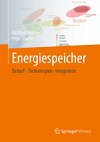 Im Kontext der Energiewende sind Energiespeicher ein zentrales technisches, wirtschaftliches und energiepolitisches Thema.
Im Kontext der Energiewende sind Energiespeicher ein zentrales technisches, wirtschaftliches und energiepolitisches Thema.
Die Autoren dieses kompakten Werkes geben einen umfassenden Überblick über die verschiedenen Aspekte der Energiespeicherung.
Sie beschreiben zunächst die Bedeutung von Energiespeichern in der Energieversorgung und definieren ihre Rolle darin. Dann
gehen sie auf den Speicherbedarf in der Strom-, Wärme- und Kraftstoffversorgung im Kontext der Energiewende ein. Im Hauptteil
werden die verschiedenen Speichertechnologien ausführlich vorgestellt sowie ihre Vor- und Nachteile diskutiert. Praktische
Anwendungsbeispiele und die Integration von Speichern über alle Energiesektoren hinweg runden das Buch ab. Zahlreiche Grafiken
und Beispiele veranschaulichen das gesamte Feld der Energiespeicher und sind als Ergänzung samt Animationen online in Farbe verfügbar.
You can find more information here.
Sustainable Energy Technologies
K. Hanjalic, R. van de Krol, A. Lekic
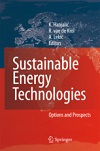 This book provides an up-to-date review of the status and prospects of different options in energy conversion
and storage technologies, as seen by a panel of world leading experts. It offers a platform for readers engaged
in planning and undertaking new energy solutions or retrofitting and redesigning the existing installations to
confront and to compare the pros and cons of various novel technology options. Contributing articles cover new
clean and zero-emission coal technologies, solar, wind, nuclear, fuel cells, hydrogen and hybrid technologies,
accompanied by treatises on the challenge of increasing global energy needs and consumption, issues of sustainability,
and on specific ideas for efficient production and use of energy based on modern rationing technologies.
This book provides an up-to-date review of the status and prospects of different options in energy conversion
and storage technologies, as seen by a panel of world leading experts. It offers a platform for readers engaged
in planning and undertaking new energy solutions or retrofitting and redesigning the existing installations to
confront and to compare the pros and cons of various novel technology options. Contributing articles cover new
clean and zero-emission coal technologies, solar, wind, nuclear, fuel cells, hydrogen and hybrid technologies,
accompanied by treatises on the challenge of increasing global energy needs and consumption, issues of sustainability,
and on specific ideas for efficient production and use of energy based on modern rationing technologies.
You can find more information here and here.
Handbook of Energy Storage – Demand, Technologies, Integration
M. Sterner, I. Stadler
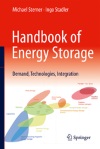 The authors of this Handbook offer a comprehensive overview of the various aspects of energy storage. After explaining the importance and role of energy storage, they discuss the need for energy storage solutions with regard to providing electrical power, heat and fuel in light of the Energy Transition.
The book’s main section presents various storage technologies in detail and weighs their respective advantages and disadvantages. Sections on sample practical applications and the integration of storage solutions across all energy sectors round out the book. A wealth of graphics and examples illustrate the broad field of energy storage, and are also available online.
The authors of this Handbook offer a comprehensive overview of the various aspects of energy storage. After explaining the importance and role of energy storage, they discuss the need for energy storage solutions with regard to providing electrical power, heat and fuel in light of the Energy Transition.
The book’s main section presents various storage technologies in detail and weighs their respective advantages and disadvantages. Sections on sample practical applications and the integration of storage solutions across all energy sectors round out the book. A wealth of graphics and examples illustrate the broad field of energy storage, and are also available online.
The book is based on the 2nd edition of the very successful German book Energiespeicher. It features a new chapter on legal considerations, new studies on storage needs, addresses Power-to-X for the chemical industry, new Liquid Organic Hydrogen Carriers (LOHC) and potential-energy storage, and highlights the latest cost trends and battery applications.
You can find more information here.
Renewable Energy Systems, 2e – A Smart Energy Systems Approach to the Choice and Modeling of 100% Renewable Solutions
H. Lund
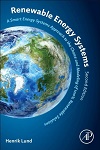 In this new edition of Renewable Energy Systems, globally recognized renewable energy researcher and professor, Henrik Lund, sets forth a straightforward,
comprehensive methodology for comparing different energy systems’ abilities to integrate fluctuating and intermittent renewable energy sources. The book does
this by presenting an energy system analysis methodology and offering a freely available accompanying software tool, EnergyPLAN, which automates and simplifies
the calculations supporting such a detailed comparative analysis. The book provides the results of more than fifteen comprehensive energy system analysis studies,
examines the large-scale integration of renewable energy into the present system, and presents concrete design examples derived from a dozen renewable energy systems
around the globe. Renewable Energy Systems, Second Edition also undertakes the socio-political realities governing the implementation of renewable energy systems by
introducing a theoretical framework approach aimed at understanding how major technological changes, such as renewable energy, can be implemented at both the national
and international levels.
In this new edition of Renewable Energy Systems, globally recognized renewable energy researcher and professor, Henrik Lund, sets forth a straightforward,
comprehensive methodology for comparing different energy systems’ abilities to integrate fluctuating and intermittent renewable energy sources. The book does
this by presenting an energy system analysis methodology and offering a freely available accompanying software tool, EnergyPLAN, which automates and simplifies
the calculations supporting such a detailed comparative analysis. The book provides the results of more than fifteen comprehensive energy system analysis studies,
examines the large-scale integration of renewable energy into the present system, and presents concrete design examples derived from a dozen renewable energy systems
around the globe. Renewable Energy Systems, Second Edition also undertakes the socio-political realities governing the implementation of renewable energy systems by
introducing a theoretical framework approach aimed at understanding how major technological changes, such as renewable energy, can be implemented at both the national
and international levels.
Download flyer here
Handbook of Process Integration (PI), 1st Edition
J. Klemes
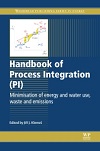 Since its first development in the 1970s, Process Integration (PI) has become an important methodology in
achieving more energy efficient processes. This pioneering handbook brings together the leading scientists
and researchers currently contributing to PI development, pooling their expertise and specialist knowledge
to provide readers with a comprehensive and up-to-date guide to the latest PI research and applications.
Since its first development in the 1970s, Process Integration (PI) has become an important methodology in
achieving more energy efficient processes. This pioneering handbook brings together the leading scientists
and researchers currently contributing to PI development, pooling their expertise and specialist knowledge
to provide readers with a comprehensive and up-to-date guide to the latest PI research and applications.
After an introduction to the principles of PI, the book reviews a wide range of process design and integration
topics ranging from heat and utility systems to water, recycling, waste and hydrogen systems. The book considers
Heat Integration, Mass Integration and Extended PI as well as a series of applications and case studies. Chapters
address not just operating and capital costs but also equipment design and operability issues, through to buildings
and supply chains.
With its distinguished editor and international team of expert contributors, Handbook of Process Integration (PI)
is a standard reference work for managers and researchers in all energy-intensive industries, as well as academics
with an interest in them, including those designing and managing oil refineries, petrochemical and power plants,
as well as paper/pulp, steel, waste, food and drink processors.
You can find more information here.
New and Renewable Technologies for Sustainable Development (2002nd Edition)
N. Afgan, M. C. Ramos de Carvalho
 Sustainable development encompasses economic, social, and ecological perspectives of conservation and change in natural resources. It is generally defined as development that meets the needs of the present without compromising the ability of future generations to meet their own needs. This definition is based on the ethical imperative of equity within and between generations.
Moreover, apart from meeting; "the basic needs of all"; sustainable development implies sustaining the natural life support systems on Earth, and extending to all the opportunity to satisfy their aspirations for a better life. Hence, sustainable development is more precisely defined as a process of change in which the exploitation of resources, the direction of investments, the orientation of technological development, and institutional change are all in harmony and enhance both current and future potential to meet human needs and aspiration.
To date, various definitions and stationary-state criteria of sustainability have been proposed. Many authors have been concerned with only part of the problem, such as the technological assumptions, the ability to substitute natural resources in economic transformation processes, and the resilience and importance of ecological processes.
But, the social dimension did not receive the same attention, and has not been adequately integrated into formal analysis. The engineering community has to play an important role in sustainable development with appropriate evaluation of the engineering systems. In this respect energy, water and environment systems require multi-criteria evaluation methods for the assessment of the economic, environmental and social aspect of the systems.
Sustainable development encompasses economic, social, and ecological perspectives of conservation and change in natural resources. It is generally defined as development that meets the needs of the present without compromising the ability of future generations to meet their own needs. This definition is based on the ethical imperative of equity within and between generations.
Moreover, apart from meeting; "the basic needs of all"; sustainable development implies sustaining the natural life support systems on Earth, and extending to all the opportunity to satisfy their aspirations for a better life. Hence, sustainable development is more precisely defined as a process of change in which the exploitation of resources, the direction of investments, the orientation of technological development, and institutional change are all in harmony and enhance both current and future potential to meet human needs and aspiration.
To date, various definitions and stationary-state criteria of sustainability have been proposed. Many authors have been concerned with only part of the problem, such as the technological assumptions, the ability to substitute natural resources in economic transformation processes, and the resilience and importance of ecological processes.
But, the social dimension did not receive the same attention, and has not been adequately integrated into formal analysis. The engineering community has to play an important role in sustainable development with appropriate evaluation of the engineering systems. In this respect energy, water and environment systems require multi-criteria evaluation methods for the assessment of the economic, environmental and social aspect of the systems.
You can find more information here.
Sustainable Utility Systems
Petar Sabev Varbanov, Jiří Škorpík, Jiří Pospíšil, Jiří Jaromír Klemeš
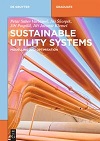 This book provides a thorough guidance on maximizing the performance of utility systems in terms of sustainability. It covers general structure, typical components and efficiency trends, and applications such as top-level analysis for steam pricing and selection of processes for improved heat integration. Examples are provided to illustrate the discussed models and methods to give sufficient learning experience for the reader.
This book provides a thorough guidance on maximizing the performance of utility systems in terms of sustainability. It covers general structure, typical components and efficiency trends, and applications such as top-level analysis for steam pricing and selection of processes for improved heat integration. Examples are provided to illustrate the discussed models and methods to give sufficient learning experience for the reader.
You can find more information here.
Sustainable Assessment Method for Energy Systems: Indicators, Criteria and Decision Making Procedure (2000th Edition)
N. Afgan, M. da Graca Carvalho
 Sustainable Assessment Method for Energy Systems provides the reader with a new method for energy system evaluation. It is widely recognized that future energy strategies will have to deal with energy as a complex issue that incorporates environmental, economic, social, cultural, educational, and material resource attributes. Sustainable Assessment Method for Energy Systems offers a new methodology based on multi-criteria indicators for the evaluation of energy as a system.
Sustainable Assessment Method for Energy Systems provides the reader with a new method for energy system evaluation. It is widely recognized that future energy strategies will have to deal with energy as a complex issue that incorporates environmental, economic, social, cultural, educational, and material resource attributes. Sustainable Assessment Method for Energy Systems offers a new methodology based on multi-criteria indicators for the evaluation of energy as a system.
You can find more information here.
Biorefineries – Targeting Energy, High Value Products and Waste Valorisation
M. Rabaçal, A. F. Ferreira, C. A. M. Silva, M. Costa
 This book addresses the potential of the transformation of biomass into a wide range of marketable products, and examines the biological, biochemical, physical and thermal processing of biomass into products such as fuels, power, heat, feeds, chemicals and materials.
Respective chapters explore various topics including biomass characterization, biomass pre-conditioning and sustainability analysis, aspects that are supplemented by a global overview of their implementation in current pilot bio-refineries.
Providing a valuable resource to energy engineers, chemical engineers, biotechnologists and economists, this book will also be of great interest to students and policymakers.
This book addresses the potential of the transformation of biomass into a wide range of marketable products, and examines the biological, biochemical, physical and thermal processing of biomass into products such as fuels, power, heat, feeds, chemicals and materials.
Respective chapters explore various topics including biomass characterization, biomass pre-conditioning and sustainability analysis, aspects that are supplemented by a global overview of their implementation in current pilot bio-refineries.
Providing a valuable resource to energy engineers, chemical engineers, biotechnologists and economists, this book will also be of great interest to students and policymakers.
You can find more information here.
Handbook of Clean Energy Systems (6 Volume Set)
J. Yan
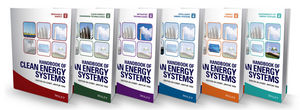 The Handbook of Clean Energy Systems brings together an international team of experts to present a comprehensive overview of the latest research, developments and practical applications throughout all areas of clean energy systems.
Consolidating information which is currently scattered across a wide variety of literature sources, the handbook covers a broad range of topics in this interdisciplinary research field including both fossil and renewable energy systems.
The development of intelligent energy systems for efficient energy processes and mitigation technologies for the reduction of environmental pollutants is explored in depth, and environmental, social and economic impacts are also addressed.
The Handbook of Clean Energy Systems brings together an international team of experts to present a comprehensive overview of the latest research, developments and practical applications throughout all areas of clean energy systems.
Consolidating information which is currently scattered across a wide variety of literature sources, the handbook covers a broad range of topics in this interdisciplinary research field including both fossil and renewable energy systems.
The development of intelligent energy systems for efficient energy processes and mitigation technologies for the reduction of environmental pollutants is explored in depth, and environmental, social and economic impacts are also addressed.
Topics covered include:
Assessing and Measuring Environmental Impact and Sustainability
J. Klemes
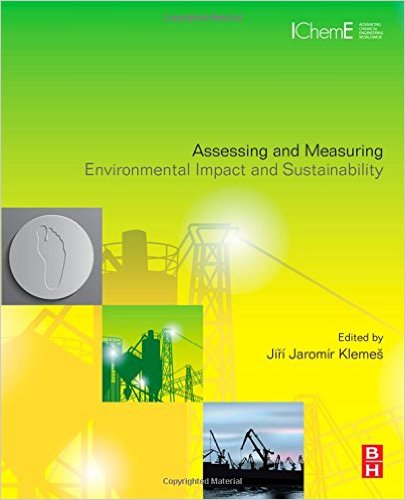 Assessing and Measuring Environmental Impact and Sustainability answers the question "what are the available methodologies to assess the environmental sustainability of a product, system or process?
Multiple well-known authors share their expertise in order to give a broad perspective of this issue from a chemical and environmental engineering perspective. This mathematical, quantitative book includes many case studies to assist with the practical application of environmental and sustainability methods.
Readers learn how to efficiently assess and use these methods. This book summarizes all relevant environmental methodologies to assess the sustainability of a product and tools, in order to develop more green products or processes. With life cycle assessment as its main methodology,
this book speaks to engineers interested in environmental impact and sustainability. *Helps engineers to assess, evaluate, and measure sustainability in industry* Provides workable approaches to environmental and sustainability assessment* Readers learn tools to assess the sustainability of a process or product and to design it in an environmentally friendly way.
Assessing and Measuring Environmental Impact and Sustainability answers the question "what are the available methodologies to assess the environmental sustainability of a product, system or process?
Multiple well-known authors share their expertise in order to give a broad perspective of this issue from a chemical and environmental engineering perspective. This mathematical, quantitative book includes many case studies to assist with the practical application of environmental and sustainability methods.
Readers learn how to efficiently assess and use these methods. This book summarizes all relevant environmental methodologies to assess the sustainability of a product and tools, in order to develop more green products or processes. With life cycle assessment as its main methodology,
this book speaks to engineers interested in environmental impact and sustainability. *Helps engineers to assess, evaluate, and measure sustainability in industry* Provides workable approaches to environmental and sustainability assessment* Readers learn tools to assess the sustainability of a process or product and to design it in an environmentally friendly way.
You can find more information here.
Treatise on Sustainability Science and Engineering
I. S. Jawahir, S. K. Sikdar, Y. Huang
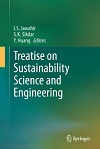 This book is aimed at providing a comprehensive overview of recent developments in
sustainability science and engineering. The book focuses on principles and practices and
presents 18 interwoven chapters on four major themes:
This book is aimed at providing a comprehensive overview of recent developments in
sustainability science and engineering. The book focuses on principles and practices and
presents 18 interwoven chapters on four major themes:
The uniqueness of this book lies in the range of topics covered with in-depth analysis and case studies.
This book will be of interest to academic and industrial researchers, professionals in
corporate and governmental organizations, and others interested in advancing the
current state-of-the-art to the next level for the benefit of our global society.
Download flyer here
Process Integration and Intensification
J. Klemes, P. Varbanov, S. R. Wan Alwi, Z. A. Manan
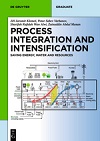 "The authors have provided all the elements required for complete understanding of the basic concepts in heat
recovery and water minimization in chemical and related processes, and followed these with carefully selected
and developed problems and solutions in order to ensure that the concepts delivered can be applied." Simon Perry, The University of Manchester.
"The authors have provided all the elements required for complete understanding of the basic concepts in heat
recovery and water minimization in chemical and related processes, and followed these with carefully selected
and developed problems and solutions in order to ensure that the concepts delivered can be applied." Simon Perry, The University of Manchester.
This graduate textbook covers fundamentals of the key areas of Process Integration and Intensification for intra-process
heat recovery (Heat Integration), inter-process heat recovery and cogeneration (Total Site) as well as water conservation.
Step by step working sessions are illustrated for deeper understanding of the taught materials.
The textbook also provides a wealth of pointers as well as further information for readers to acquire more
extensive materials on the diverse industrial applications and the latest development trends in Process
Integration and Intensification. It is addressed to graduate students as well as professionals to help
the effectively application of Process Integration and Intensification in plant design and operation.
You can find more information here.
Download flyer here
2004 New And Renewable Energy Technologies For Sustainable Development
M. Da Graca Carvalho, N. Afgan
 New and renewable energy systems will play an important role in the sustainable development of a future energy strategy. Recent development in this field has proved that the virtual energy system including new and renewable energy sources is feasible. The promotion of renewable sources of energy is a high priority, for security and diversification of energy supply, environmental protection, and social and economic cohesion.
This volume discusses the latest research on new and renewable energy resources and their utilization, emphasizing the present state of the art in the field and potential future development.
New and renewable energy systems will play an important role in the sustainable development of a future energy strategy. Recent development in this field has proved that the virtual energy system including new and renewable energy sources is feasible. The promotion of renewable sources of energy is a high priority, for security and diversification of energy supply, environmental protection, and social and economic cohesion.
This volume discusses the latest research on new and renewable energy resources and their utilization, emphasizing the present state of the art in the field and potential future development.
You can find more information here.
Sustainability in the Process Industry: Integration and Optimization
J. Klemes, F. Friedler, I. Bulatov, P. Varbanov
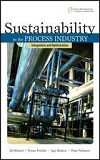 Proven techniques for creating sustainable operation environments This must-have text for process industry
professionals describes and analyzes how to considerably improve the efficiency and sustainability of process
industry practices. The book features process integration (PI) and optimization methodology, and presents ample
industrial case studies for industry professionals to learn practical operational solutions. Sustainability in
The Process Industry is the first comprehensive work to integrate optimization and targeting tools for process
design and operation. The book is ideal for postgraduate students and continuing professional development courses
and for practitioners from various fields of the process industry.
Proven techniques for creating sustainable operation environments This must-have text for process industry
professionals describes and analyzes how to considerably improve the efficiency and sustainability of process
industry practices. The book features process integration (PI) and optimization methodology, and presents ample
industrial case studies for industry professionals to learn practical operational solutions. Sustainability in
The Process Industry is the first comprehensive work to integrate optimization and targeting tools for process
design and operation. The book is ideal for postgraduate students and continuing professional development courses
and for practitioners from various fields of the process industry.
You can find more information here and here.
Fluidized Bed Combustion
S. Oka
 A realization of recent clean energy initiatives, fluidized bed combustion (FBC) has quickly won industry preference due to its ability to burn materials as diverse as low-grade coals, biomass, and industrial and municipal waste. Fluidized Bed Combustion catalogs the fundamental physical and chemical processes required of bubbling fluidized beds before launching into application-centered coverage of hot-gas generator, incinerator, and boiler concepts and design, calculations for regime parameters and dimensions, and all aspects of FBC operation.
It enumerates the environmental consequences of fluidized bed processes and proposes measures to reduce the formation of harmful emissions.
A realization of recent clean energy initiatives, fluidized bed combustion (FBC) has quickly won industry preference due to its ability to burn materials as diverse as low-grade coals, biomass, and industrial and municipal waste. Fluidized Bed Combustion catalogs the fundamental physical and chemical processes required of bubbling fluidized beds before launching into application-centered coverage of hot-gas generator, incinerator, and boiler concepts and design, calculations for regime parameters and dimensions, and all aspects of FBC operation.
It enumerates the environmental consequences of fluidized bed processes and proposes measures to reduce the formation of harmful emissions.
You can find more information here.
Compact Heat Exchangers for Energy Transfer Intensification: Low Grade Heat and Fouling Mitigation
J. Klemes, O. Arsenyeva, P. Kapustenko, L. Tovazhnyanskyy
 Compact Heat Exchangers for Energy Transfer Intensification: Low-Grade Heat and Fouling Mitigation provides theoretical and experimental background
on heat transfer intensification in modern heat exchangers. Emphasizing applications in complex heat recovery systems for the process industries, this book:
Compact Heat Exchangers for Energy Transfer Intensification: Low-Grade Heat and Fouling Mitigation provides theoretical and experimental background
on heat transfer intensification in modern heat exchangers. Emphasizing applications in complex heat recovery systems for the process industries, this book:
Compact Heat Exchangers for Energy Transfer Intensification: Low-Grade Heat and Fouling Mitigation not only highlights key developments in compact heat exchangers, but also instills a practical knowledge of the latest process integration and heat transfer enhancement methodologies.
You can find more information here.
New Developments in Heat Exchangers (1st Edition)
N. Afgan, A. Bar-Cohen, D. Butterworth, W. Roetzal, M. da Graca Carvalho
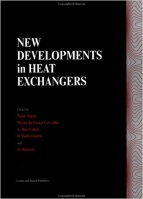 Examines recent research results on integrated intelligent systems for engineering design based on distributed artificial intelligence (DAI), computer-integrated manufacturing systems (CIMS), and intelligent computer-aided design systems (ICAD). Presents both theory fundamentals and implementation technology, as well as industrial applications. Introduces a new problem-solving strategy for engineering design and its implementation based on integrated distributed artificial intelligence technology in detail. Explores six application case studies, including missile system design, mechanical transmission design, process control system design, and chemical process design.
Examines recent research results on integrated intelligent systems for engineering design based on distributed artificial intelligence (DAI), computer-integrated manufacturing systems (CIMS), and intelligent computer-aided design systems (ICAD). Presents both theory fundamentals and implementation technology, as well as industrial applications. Introduces a new problem-solving strategy for engineering design and its implementation based on integrated distributed artificial intelligence technology in detail. Explores six application case studies, including missile system design, mechanical transmission design, process control system design, and chemical process design.
You can find more information here.
